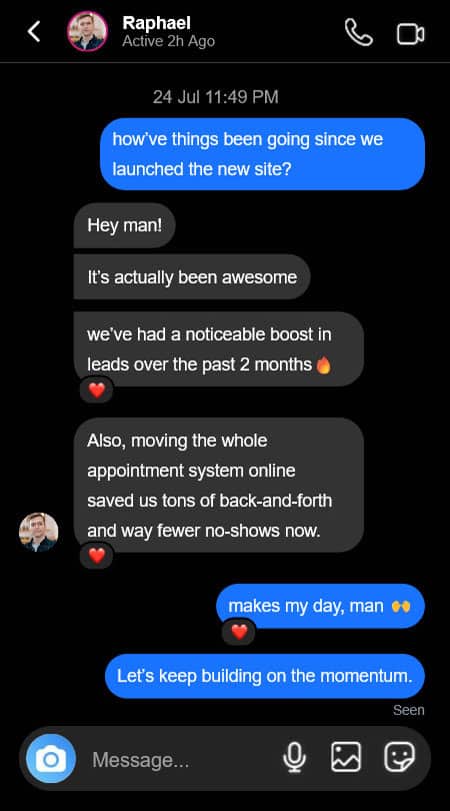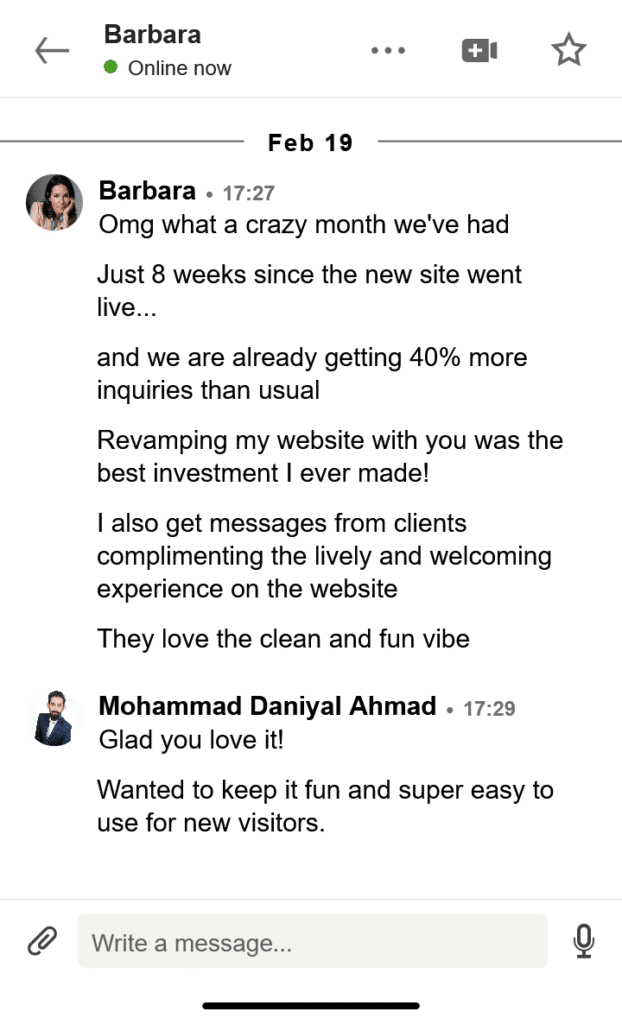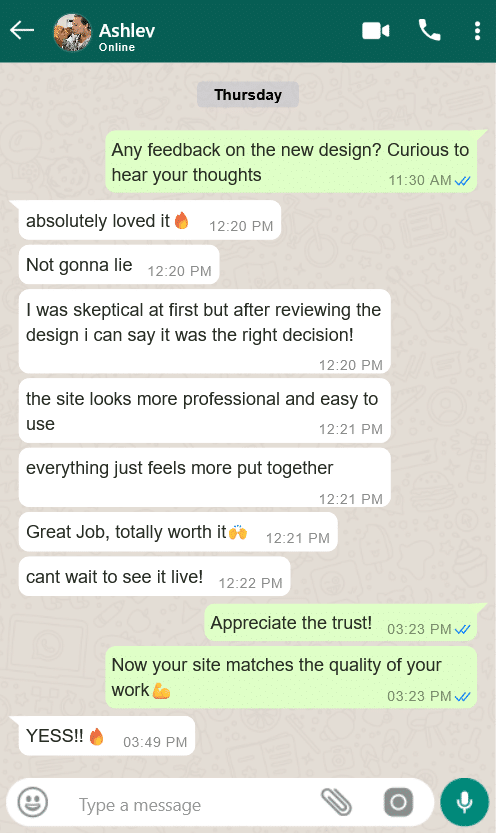- Tired of word-of-mouth to get clients and sick of admin chaos and no-shows?
- Feel stuck when referrals slow down?
Turn your website into a high-performance client-getting machine even if it's outdated, broken or just sitting there doing nothing

The Powerful Little Response-boosting Secret No Web Designer Will Ever Tell You
- Ugly truth #1
Most Web Designers
Obsess Over “Pretty”
No clear value proposition above the fold
Most visitors decide within 3 seconds if your site is for them. If it’s not clear who you help and how, they bounce.
No clear path to take action
CTA does not tell people exactly what to do next (aka: one button buried at the bottom)
It focuses too much on you, not your client
No emotional hook to connect
Copy sounds robotic and does not speak directly to their dream client's pain points
It doesn’t build trust instantly
Lack of social proof, real photos, or credibility markers creates doubt instead of confidence.
Cluttered layout and confusing navigation
Visitors feel lost when they struggle to find the information they were looking for, and leave.
It looks great on a laptop and not much else
Over 70% of traffic is on phones — and if your site isn’t mobile-friendly, you're turning away most of your potential clients.
Website loads at a snail's pace
- Ugly truth #2
Word-of-mouth and referrals are why so many great businesses still struggle to grow
- Get more visitors to reach out
- Make you look like the obvious choice
- Work for you even while you sleep
- Help you grow without you chasing people down
- Or hoping someone passes your name along
- Ugly Truth #3
The only thing standing between you and peace of mind is a broken process
- Your whole appointment system and follow-up process ran automatically?
- Letting clients self-manage their bookings and reschedules
- Saving you hours of admin work daily
- While cutting down no-shows and last minute cancellations
- Free report
13 'Inside secrets' no web designer or agency would dare tell you!

- 5 Conversion-Critical Elements every service business website needs (and most don’t have)
- 13 Money-Murdering Mistakes no web designer would dare tell you
- How to build trust instantly even with cold visitors
- The #1 mistake that silently kills your conversions and how to fix it fast
- The appointment-setting funnel you can steal and plug into your site today — designed to pre-qualify leads and book only serious prospects who are genuinely interested in your service (no more time-wasters).
- And much, much more!
How to finally make your website your #1 salesperson without lifting a finger or paying a dime upfront!
- works 24/7 to get you clients on autopilot
- grows your visibility online
- position you as THE go-to expert in your area
- gives you the ability to save hours on admin work
- reduce no-shows and last-minute cancellations
- let clients self-manage their bookings or reschedules while you're busy doing work you love
TL;DR Version

Frequently Asked Questions
What is the difference between a landing page and a website?
Good question. It’s one we get asked all the time. It all boils down to focus and the conversions – leads, sales or whatever action you want visitors to take – that results.
As the main page on a website, the focus of a homepage is to give an introduction into a company’s values and their product/service. The layout and content is specifically designed to pique the interest of visitors and encourage them to explore the other pages on the site.
In contrast, the whole focus of a landing page is conversion. It’s a standalone page (that’s usually built on a company’s website domain) that’s designed to trigger a specific action of the user. It gets rid of distraction and keeps the user focused on one thing, whether that’s signing up for a newsletter, booking an appointment or buying a product.
What are the main benefits of using a landing page design agency?
Increased conversions
It works, while you don’t
A landing page supports your business goals
Data generation and valuable insights by means of user tracking
Develops brand awareness
Did we mention increased conversions?
Can you make landing pages for e-commerce websites?
Yes. You have a product to sell and a landing page is one of the most effective ways to persuade visitors to act on an offer. We’ll use a magnetic headline, trust indicators, social proof and other kickass elements to compel visitors to take action and hit that CTA button.
But this approach isn’t suitable for all businesses. Ecommerce landing pages are very effective if you sell one product. Once you start expanding your business and product range, landing pages no longer make sense as a standalone web project.
My homepage is great, why do I need a landing page?
A homepage is typically a summary of your business and a directory for your products or services. You could say it’s like a digital foyer / welcome page for your business. Home Pages are great, but they rarely drive conversions. A landing page, in comparison, is a single focused page that is designed with one goal in mind. That goal is conversions. A landing page:
Does not link out to other pages
Does not try to sell multiple products or services
Does not try to reach multiple audiences same time
Should I run traffic to a landing page or my homepage?
Always a landing page. It’s simple. Here’s an example why;
Let’s say a customer clicks on your ad after searching Google for ‘gas fitting services in South Melbourne’. They didn’t search for your company; they’re just looking for a gas fitter and decided to click on your ad. Instead of taking the user to a landing page that’s kitted out with all the info they need to know about your gas fitting services, they end up on your homepage – a page that is littered with information and category listings that are linked to all the services you offer. They’re now looking at a page that talks about emergency plumbing and plumbing maintenance.
That user now has to figure out how to find out about your gas fitting services. That takes time. It takes effort. And it will most likely result in a bounce.
Do I need a landing page for each service I offer?
YES! Landing pages are most effective when they are talking about one product or service. Why? Because it’s…
More direct
More targeted
More informative
More impactful












